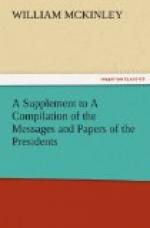Everything indicates that with the speedy suppression of the Tagalo rebellion life in the archipelago will soon resume its ordinary course under the protection of our sovereignty, and the people of those favored islands will enjoy a prosperity and a freedom which they have never before known. Already hundreds of schools are open and filled with children. Religious freedom is sacredly assured and enjoyed. The courts are dispensing justice. Business is beginning to circulate in its accustomed channels. Manila, whose inhabitants were fleeing to the country a few months ago, is now a populous and thriving mart of commerce. The earnest and unremitting endeavors of the Commission and the Admiral and Major-General Commanding the Department of the Pacific to assure the people of the beneficent intentions of this Government have had their legitimate effect in convincing the great mass of them that peace and safety and prosperity and stable government can only be found in a loyal acceptance of the authority of the United States.
The future government of the Philippines rests with the Congress of the United States. Few graver responsibilities have ever been confided to us. If we accept them in a spirit worthy of our race and our traditions, a great opportunity comes with them. The islands lie under the shelter of our flag. They are ours by every title of law and equity. They cannot be abandoned. If we desert them we leave them at once to anarchy and finally to barbarism. We fling them, a golden apple of discord, among the rival powers, no one of which could permit another to seize them unquestioned. Their rich plains and valleys would be the scene of endless strife and bloodshed. The advent of Dewey’s fleet in Manila Bay instead of being, as we hope, the dawn of a new day of freedom and progress, will have been the beginning of an era of misery and violence worse than any which has darkened their unhappy past. The suggestion has been made that we could renounce our authority over the islands and, giving them independence, could retain a protectorate over them. This proposition will not be found, I am sure, worthy of your serious attention. Such an arrangement would involve at the outset a cruel breach of faith. It would place the peaceable and loyal majority, who ask nothing better than to accept our authority, at the mercy of the minority of armed insurgents. It would make us responsible for the acts of the insurgent leaders and give us no power to control them. It would charge us with the task of protecting them against each other and defending them against any foreign power with which they chose to quarrel. In short, it would take from the Congress of the United States the power of declaring war and vest that tremendous prerogative in the Tagal leader of the hour.




